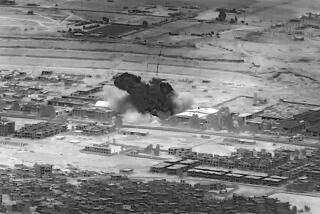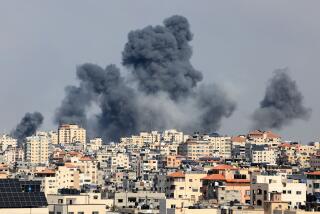4 Soldiers Die Amid Attacks in Iraq
BAGHDAD — Roadside bombs killed four U.S. soldiers Wednesday as tens of thousands of American troops across Iraq spent a tense Christmas Eve in a high state of readiness against attack by insurgents.
Five Iraqi civilians and a suicide attacker were killed in bombings in Baghdad and the northern city of Irbil, making it the deadliest day for both Iraqis and the U.S. military since the Dec. 13 capture of Saddam Hussein.
In Baghdad, a heavily fortified downtown hotel was the target of two attacks in less than 12 hours. Late Wednesday, assailants fired what was believed to have been mortar rounds at the Ishtar Hotel, where many Western contractors stay, but missed. At first light this morning, another blast, apparently also from a mortar, shattered windows in the 19-story hotel on the eastern bank of the Tigris River.
At least three other Christmas morning explosions rocked the neighborhood near the so-called Green Zone, the sealed-off former palace compound in the heart of Baghdad that serves as the headquarters of the U.S.-led administration in Iraq. There were no immediate reports of casualties, but warning sirens wailed inside the complex and U.S. helicopters thundered overhead.
Three of the slain American soldiers, identified as members of the 4th Infantry Division’s Task Force Iron Horse, were traveling in a convoy Wednesday outside the town of Samarra, north of Baghdad, about 9 a.m. when their vehicle struck what the military calls an improvised explosive device.
Last week, U.S. forces conducted a major offensive in Samarra, a stronghold of the pro-Hussein insurgency and the scene of frequent attacks against U.S. troops.
Samarra lies on the northern edge of the so-called Sunni Triangle, where remnants of Hussein’s regime, Baathist loyalists who enjoyed power and prestige under his rule, are now the driving force behind a guerrilla war targeting the U.S.-led coalition.
Early today, the military said a fourth soldier was killed Wednesday by another roadside bomb in north-central Baghdad.
In the largely autonomous Kurdish north, a powerful car bomb exploded in the heart of the city of Irbil, killing at least four people along with the bomber. About 20 others were injured.
And in Baghdad, one Iraqi was killed and at least two others injured when a roadside bomb detonated in a traffic tunnel during the midday rush. Iraqi police said the victims were riding in a civilian minibus that was driving by as the device -- probably planted to target a U.S. military vehicle -- went off.
Against this backdrop of roiling unrest, American troops pressed ahead with a hunt for suspected insurgents, carrying out house-to-house searches in several towns and cities. The latest raids netted one important suspect, a tribal sheik described as a close associate of one of the former regime’s top fugitives.
The man, arrested in the northern city of Mosul, was identified as Ghazi Hanash, who has strong ties to Izzat Ibrahim, the former vice chairman of the Hussein regime’s ruling Revolutionary Command Council. Ibrahim is now at the top of the American-compiled most-wanted list and believed by investigators to be an important figure in the anti-U.S. insurgency.
Dozens of suspected insurgents have been detained in the days since Hussein’s capture near his ancestral hometown of Tikrit.
U.S. commanders had said they expected at least a temporary spike in attacks aimed at the coalition and its allies in the wake of Hussein’s arrest, and that they consider the level of threat to be particularly high over the Christmas holidays.
As part of what military officials describe as a continuing anti-insurgent campaign, American aircraft unleashed a thunderous barrage over southern Baghdad late Tuesday and early Wednesday. No casualties were reported, and no damage was seen by reporters touring the area. Military spokesmen later said the targets were sites from which rockets and mortars had been fired.
American officials hinted that the predawn cacophony -- which could be heard miles away, rattling windows across the entire capital -- might have been intended mainly as a show of force to intimidate pro-Hussein guerrilla cells thought to be operating in the area.
Residents on this ragged edge of the city responded to the intense four-hour barrage, which ended at around 3 a.m., with angry complaints.
“I’ve got eight kids, and I swear to God none of them slept,” said a red-eyed Abbas abu Zeina, 52, who runs a car-repair shop. “What’s the point of all this? My littlest girl was trembling through it all, no matter how close my wife and I held her.” More explosions were heard late Wednesday and early today in the same area.
Support for the insurgents runs high in the swath of riverside territory on Baghdad’s southern outskirts, a Sunni and tribal-dominated area where the city peters out into date groves and lettuce fields.
“My uncle is in the resistance -- almost all of us have a family member who is,” said Walid Mohammed, 31, who was sheltering around a campfire with a group of grove workers.
“The Americans are just trying to flex their muscles,” his 25-year-old companion, Rifat Hadi Nayef, added. “We are not impressed.”
The suicide car bombing in Irbil shattered what had largely been a prevailing calm in the Kurdish north, a region generally less volatile and dangerous than other parts of the country since the fall of Hussein.
Irbil, 220 miles north of Baghdad, is the seat of the Kurdish parliament and several government ministries. The target of Wednesday’s bombing was the Interior Ministry, where a similar attack had been foiled six weeks earlier.
The bomb exploded just outside the ministry’s gates, incinerating nearby cars and sending pedestrians fleeing in terror.
“It was atrocious,” witness Hoshiar Aziz said.
A police colonel, Khorsheed Abdullah, said authorities were investigating the possibility that the bomber was a foreign jihadi.
More to Read
Sign up for Essential California
The most important California stories and recommendations in your inbox every morning.
You may occasionally receive promotional content from the Los Angeles Times.










